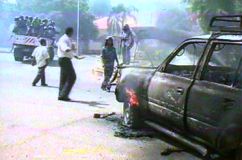Sudanese police round up suspected looters after riots
JUBA, Sudan, Aug 4, 2005 (AP) — Police Thursday detained hundreds of people suspected of looting from the Arab minority during two days of deadly clashes in this Nile River port town following the death of popular southern leader John Garang.

|
|
Police stand next to a burning car in Khartoum, Sudan Monday Aug. 1, 2005. (AP). |
The Sudanese Red Crescent reported that 130 people were killed in three cities – Khartoum, the capital, and Juba and Malakal in the south – and more than 400 injured in three days of rioting, which also destroyed vehicles and shops and homes.
Arab northerners continued to flee this southern town in fear of attacks by ethnic African southerners who blamed the government in the north for Garang’s death in Saturday’s helicopter crash southern Sudan – three weeks after he was sworn in as the country’s first vice president and president of the autonomous government of southern Sudan.
Garang’s former rebel movement, the Sudan People’s Liberation Movement, appealed for calm between the two ethnic groups in Africa’s largest country.
The violence “is against the values that Garang fought for – the values of liberation and building a new Sudan for all its people, regardless of race or religion,” SPLM spokesman Yasir Arman said by telephone from neighboring Kenya. “Confrontation is not in the interests of the SPLM. It is in the interest of enemies of SPLM.”
Clashes in Juba killed 13 people, according to the Sudanese Red Crescent. Far north in the capital, Khartoum, 111 were killed in violence perpetrated by residents from the south, north and west of the country.
Residents of Khartoum neighborhoods hit hardest by the violence reported few overnight clashes. On Thursday, the capital was calm and many shops opened for the first time since the news of Garang’s death was reported on Monday. Workers repaired broken windows on cars and buildings and swept up debris in front of offices.
The violence raised concerns about the fragile north-south peace deal signed in January, which brought Garang to Khartoum as first vice president as part of the power and wealth-sharing agreement and raised hopes for peace throughout Sudan after decades of fighting. Leaders of the government and of the SPLM assured that they were committed to continuing the peace process.
“We assert that we are keen on proceeding forward until peace is achieved,” President Omar al-Bashir said in a nationally televised speech Wednesday.
The SPLM has named Salva Kiir Mayardit to succeed Garang as leader of the group and president of southern Sudan. Under the peace agreement, he will also be sworn in as first vice president of Sudan.
Garang’s body has been lying in a casket in New Town, one of his former bases in the south. On Friday, it will be taken to the southern towns of Rumbek and Bor for supporters to pay condolences before he is buried on Saturday in Juba, the south’s largest town and the designated capital for an autonomous southern Sudan.
On Thursday in Juba, dozens of suspected looters were detained and at least two trucks ferried others to unknown destinations, witnesses said outside the dusty square, where they watched through barbed wire fence as officers sorted looted sacks of grain, flour, plastic buckets and other household items.
Security forces “took two truckloads of people … we don’t know where they have been taken,” Jane Martin, a 30-year-old mother of seven, said before a brief burst of gunfire erupted from an unknown location.
As shops smoldered nearby and children darted across shattered doors to grab goods inside, dozens of armed police officers kept watch outside locked up businesses owned by Arab traders who have fled.
Hundreds of former rebel fighters also arrived in Juba overnight to protect their leaders planning to attend Garang’s funeral Saturday.
The rebel fighters deployed after dozens of troops from Sudan’s elite presidential guards arrived in Juba.
The security measures weren’t enough for the 1,265 Arabs in Juba, who were targeted by southerners in the rioting. Dozens gathered at the airport to catch flights to Khartoum, 1,200 kilometers north of this sprawling town of mud huts with conical thatched roofs, dilapidated buildings and no running water.
